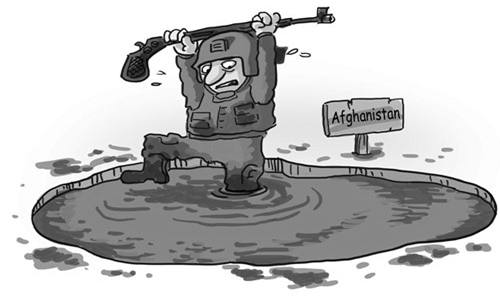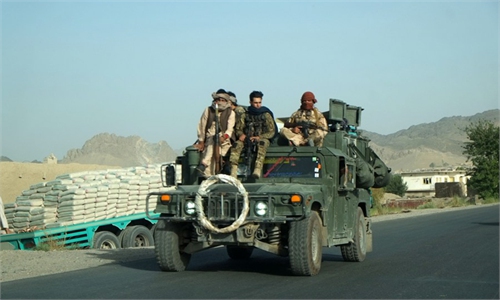
Illustration: Liu Rui/GT
On Wednesday in New Delhi, US Secretary of State Antony Blinken and Indian External Affairs Minister Subrahmanyam Jaishankar reaffirmed their commitment to deepening the US-India security partnership. The two sides also discussed the situation in Afghanistan. Blinken said India "has and will continue to make vital contribution to Afghanistan's stability and development."Blinken mentioned that the international community would make a "pariah state" of an Afghan government that "does not respect the rights of its people," and Jaishankar said "the outcome in Afghanistan should not be decided on the battlefield."
US-India relations have been moving closer in recent years. But it seems that Washington aims to take advantage of New Delhi to safeguard its own interests after withdrawing from Afghanistan. During his visit, Blinken appeared to be giving New Delhi a more important role in terms of the Afghan issue and to boost India's morale. With the increasing momentum of US-India security cooperation, Washington hopes that New Delhi will be a handy helper in the Afghan issue.
Washington is well aware that in the context of Afghanistan's chaos, New Delhi will be thrust into a difficult situation. Washington knows that New Delhi has bad relations with the Taliban. However, Washington is only paying a lip service to India. After all, the US itself is mired in Afghanistan, failing to maintain regional peace and stability.
India hopes to play an active role on the Afghan issue to satisfy its own interests and counter Pakistan. Both India and Pakistan have important strategic, ideological and economic interests in Afghanistan.
Pakistan is a neighboring country of Afghanistan. Afghanistan has deeper historical origins with Pakistan than with India, since Pashtuns are the largest ethnic group in Afghanistan and the second-largest ethnic group in Pakistan. Therefore, India wants to expand its strategic influence in Afghanistan to create a major containment of Pakistan.
Since US-led forces ousted the Taliban from power in Afghanistan in 2001, New Delhi has maintained close relations with Kabul. India has invested heavily in Afghanistan in terms of economy and infrastructure. From India's perspective, the security threat from the northwest, including Afghanistan, has always been one of its biggest challenges. Afghanistan has suffered from chaos and frequent wars over the past decades. New Delhi is worried that this may impact its own security, especially the possibility of a tense turn of situation in Kashmir.
In this light, both Washington and New Delhi have vested interests in terms of the Afghan issue. There is no doubt this will become a significant factor influencing the future of Afghanistan. During a meeting in Tianjin on Wednesday with Mullah Abdul Ghani Baradar, political chief of the Afghan Taliban, Chinese State Councilor and Foreign Minister Wang Yi said that the Afghan Taliban, as a critical military and political force in the country, is expected to play an important role in the peace, reconciliation and reconstruction process of Afghanistan.
The US has always believed that after its withdrawal, China, as Afghanistan's largest neighbor, will inevitably fill the so-called security vacuum and completely replace the position of the US in Afghanistan. With such a zero-sum mentality, Washington is anxious. Washington has used various occasions, including the meeting between Blinken and Jaishankar, to sensationalize China's influence. Bringing New Delhi deeper into the issue is also in line with Washington's strategic needs. It suits India's overall desires too.
The US has not learned the real lessons from its failure in Afghanistan: The US intervention is the major reason why the situation in Afghanistan is currently so chaotic.
China and India actually have room for cooperation and common interests in maintaining stability in Afghanistan. For example, Afghanistan has become the key hub for the "China-India Plus" cooperation plan. China and India also held the second joint China-India Capacity Building Program for Diplomats from Afghanistan in 2019. However, such cooperation depends on whether India can maintain a normal pragmatic attitude to help China-India relations back on track, instead of being obsessed with geopolitics from Washington's agenda.
The author is director of the research department of the National Strategy Institute at Tsinghua University. opinion@globaltimes.com.cn


